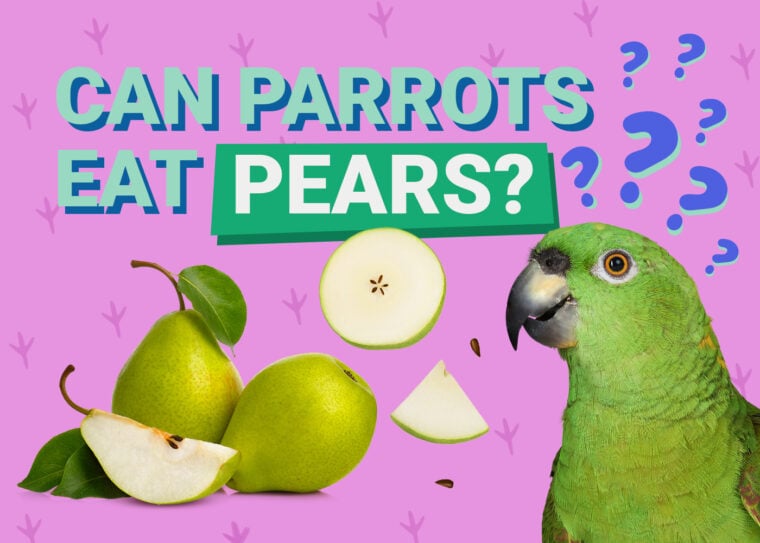
Parrots that are kept as pets rely on us to feed them foods that are safe and provide plenty of nutrition. They are highly sociable animals, which means that they may want to copy whatever their caretakers do, including their eating habits. If your favorite snack is a pear, you may be wondering whether or not it is safe to give a little piece to your feathered friend.
Yes, you can feed pears to parrots. Not only are pears safe for parrots, but they also provide many nutritional benefits that are essential to a parrot’s diet. That’s why they are often used as an ingredient in parrot food. But don’t just take our word for it. As with any food, there are certain things to know before giving anything to your pet that they don’t normally eat. We provide that information in this article.
 The 6 Nutritional Benefits Taht Pears Have for Parrots
The 6 Nutritional Benefits Taht Pears Have for Parrots
We know that pears are nutritious for humans to eat. Many of the nutrients that are found in pears are also good for parrots. The micronutrients that they help to keep their vision, hearing, immune system, bones, and nerves in tip-top shape. Let’s take a closer look at some of the specific vitamins and minerals that can be found in pears and the benefits that they provide.
1. Antioxidants
Sometimes birds are more susceptible to diseases that they may or may not be able to transmit to humans. Pears are high in antioxidants, which help to support the immune system and keep your parrot healthy.
Pears are rich in vitamin C, a powerful antioxidant that helps neutralize free radicals, thus protecting the body from disease processes. Parrots can synthesize their own vitamin C, so additional supplementation is not required, but obtaining it from natural sources helps boost their immunity, making them more resistant to stress and disease.

2. Magnesium
Magnesium is a key mineral found in pears that helps with bone, muscle, and nerve functions. It plays an important role in many of the enzyme systems in your bird’s body.
3. Phosphorus
In addition to calcium, the phosphorus found in pears plays a key role in forming bones and function.
Phosphorus is crucial for your parrot’s metabolism. It is part of the phospholipids of the cell membrane’s structure.
4. Potassium
Potassium is an essential nutrient for the body to function properly. One of its most important jobs is keeping a parrot’s muscles working the way they should, particularly the heart. Potassium has a crucial role in the acid-base balance and maintaining the equilibrium in your parrot’s body.

5. Vitamin A
Vitamin A is an essential nutrient for parrots because many pet birds have a deficiency of this nutrient. This is due to the fact that a lot of pet birds are fed a diet that consists entirely of seeds and nuts, which don’t naturally contain this vitamin.
Feeding fruits and vegetables, including pears, that contain vitamin A to your parrot can help to keep their skin and beak healthy. Vitamin A also helps to maintain mucus membranes around their eyes and nostrils. Without it, your parrot may be more prone to sinus infections and abscesses and in worse cases, deformities.
6. Vitamin K
Last but certainly not least, the vitamin K found in pears works along with potassium to help form blood clots.
Can All Species of Parrot Eat Pears?
All species of parrots can eat pears, but not all species should have the same amount. Pears and fruits in general should never be the main food source for your parrot because fruits lack other nutrients, such as proteins, that are essential to the bird’s health. The number of pears your parrot can eat per week depends on the size, weight, and nutritional needs of the particular species.
African Grey Parrot
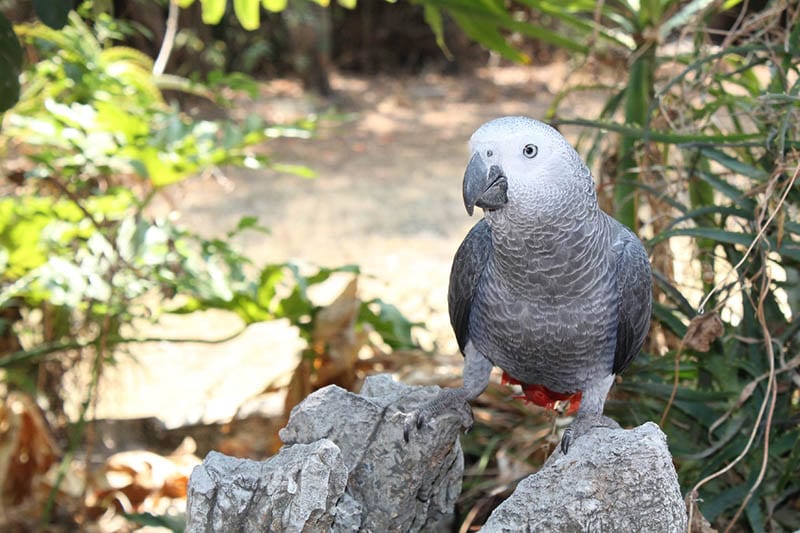
African grey parrots should be given a small amount of fresh fruits and vegetables every day, but those fruits and vegetables should make up no more than 25% of their diet. That means that you shouldn’t feed them a whole pear every day. Rather, you can cut a pear into pieces and give them some two to three times per week.
Amazon Parrot

Like African grey parrots, Amazon parrots can have a little fresh fruit each day. But again, fruit such as pears should make up only around 20-25% of their diet. If you feed your parrot a little bit of pear every day, they may become tired of it. Mix it up by only giving them pear on certain days and providing other fruits and vegetables in a varied salad throughout the week.
Eclectus Parrot
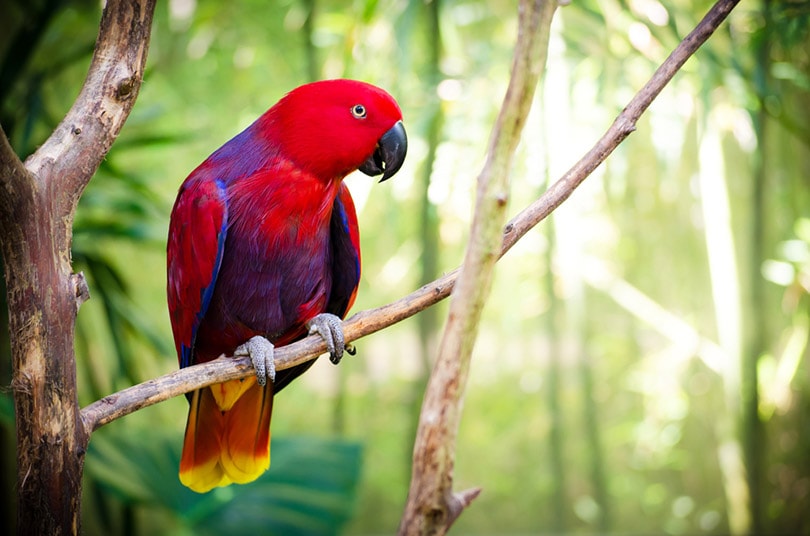
A large portion of an eclectus parrot‘s diet should consist of fruits and vegetables. This is due to them having a longer gastrointestinal tract, which means it takes them longer to digest their food. Fruits and vegetables have just the right balance of nutrients to keep them healthy. However, a large variety of fruits and vegetables is better for their health, so pears should only be given occasionally.
Quaker Parrot
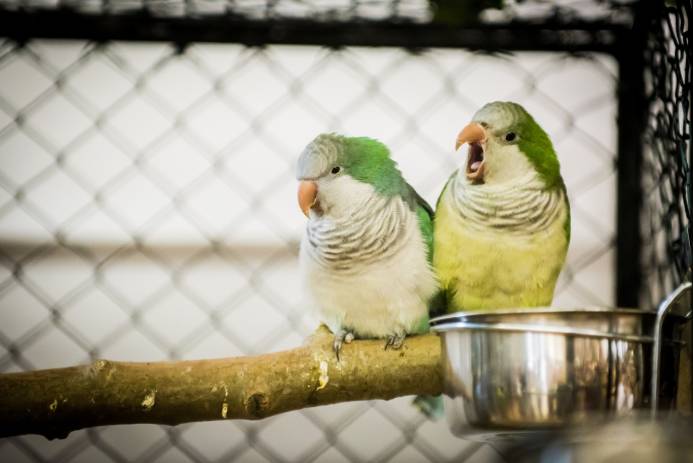
Quaker parrots are smaller and therefore don’t require as much fruit as some of the larger parrot species. Fruits contain a lot of sugar, and too much sugar can actually be unhealthy for your bird’s microbiome. In general, fruit such as pears should only make up around 20% of their diet and be given around one to three times per week.
How Should You Prepare Pears for Parrots?
To keep your parrot safe, there are several things you should know when feeding them pears. For one thing, only raw pears should be given to your parrot. Don’t give them cooked pears, as the nutrients and sugars behave differently in cooked pears and may harm the bird if eaten.
When feeding your parrot raw pears, you must wash the pear first to remove any pesticides that could harm your bird if ingested. After washing the pear, you can choose to leave the skin on or peel it off. But remember that the skin contains some of the beneficial antioxidants.
You can feed the pear to the parrot whole, but as a precaution, we recommend removing the seeds. It might be easier to cut it up into smaller pieces and place it on a dish. Whichever way you choose, don’t leave the pear with your parrot for longer than an hour. It will start to oxidize and turn brown, which messes up some of the nutritional value.

What Other Fruits Are Safe for Parrots?
In addition to pears, there are many other fruits that are safe for parrots to eat. These fruits include:
But again, don’t feed your parrot too much fruit because it can make them sick. You can mix up the fruits and vegetables that you do give them, though. The best way to do so is in the form of a varied fruit salad.
What Fruits Are Not Safe for Parrots?
Not all fruits are safe for parrots to eat. You should never give your parrot avocados or rhubarb, as they contain toxins that could harm your bird. While apples and fruits with pits (apricots, peaches, plums, etc.) are safe for parrots, they should not eat apple seeds or fruit pits because they contain toxic cyanide.
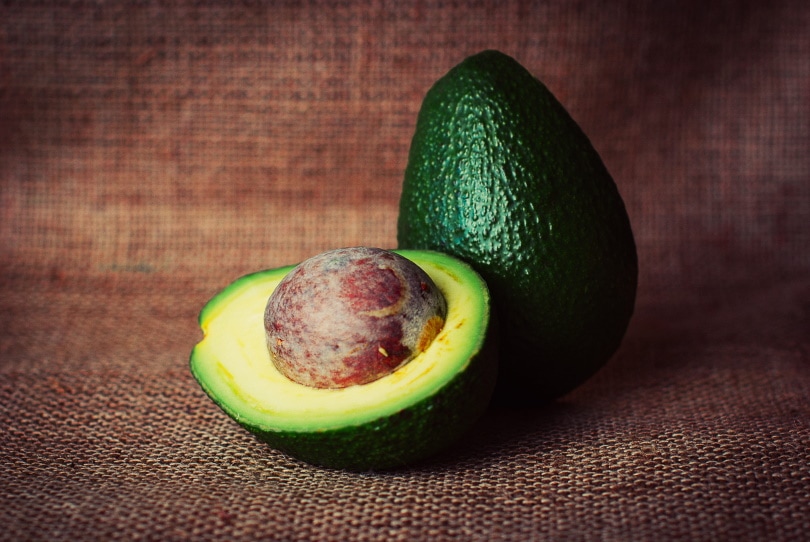
 Final Thoughts
Final Thoughts
Parrots benefit from many of the nutrients that are found in pears, particularly vitamin A and antioxidants. But fruits such as pears should not make up the whole of your parrot’s diet. Pears should only be given up to three times per week as part of a varied salad that also includes vegetables. You should be offering your parrot no more than 5% of seeds, so most of their diet should come from balanced pellets, vegetables, and fruits.
- Here’s another interesting read: Can Parrots Eat Dates? What You Need to Know!
Featured Image Credit: Creative Zone, Shutterstock


 The 6 Nutritional Benefits Taht Pears Have for Parrots
The 6 Nutritional Benefits Taht Pears Have for Parrots







